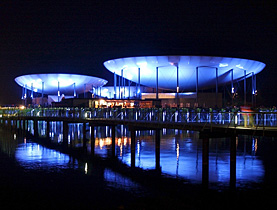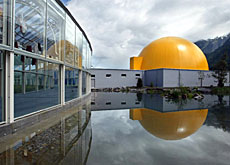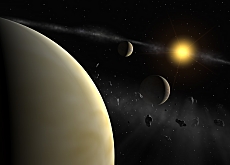British UFO files leave some looking skyward

The release in Britain of thousands of pages of documents on alleged UFO sightings has caused some in Switzerland to ask what happens with similar information here.
While the military used to record unexplained sightings, it says it no longer does so, and what files exist are largely open to the public.
The National Archives in Britain last Monday posted 14 files online covering reports of 800 supposed encounters with UFOs between 1993-1996, including the complete dossier on Britain’s most famous brush with ET, the “Rendlesham Forest Incident”.
The 4,000-plus pages of once-secret documents date back to 1981 and are the fourth time Britain’s defence ministry has released UFO files since May under freedom of information requests. More files are due to be released throughout 2010.
“To the best of my knowledge there are no such files in Switzerland,” Jürg Stüssi, an historian at the Swiss military library in Bern told swissinfo.ch.
“Of course, you can never be sure. There might be somebody in some abandoned airfield that has assembled a collection of documents. I don’t know about that but I don’t want to exclude what I cannot possibly know.”
Ants in the universe
The contents of the newly released British files range from the whacky – talking lemon-like alien heads – to the creepy, with 70 police and military witnesses seeing a massive, silent ship cruising the South Wales sky early on a March morning in 1993.
The Rendlesham Forest Incident of December 1980 involved strange lights in the Suffolk forest and a pulsating object that left an impression in the ground and inconclusive radiation readings.
Most of the unusual events had rather unexciting explanations – weather balloons, satellites, military aircraft manoeuvers. But some could not be explained and that raises questions about who’s watching us and who knows about it, says Erich von Däniken, creator of Switzerland’s Mystery Park and author of 32 books about extraterrestrials in the ancient world.
“The universe is full of intelligent forms of life and we are just a tiny part of it, like ants,” he told swissinfo.ch.
“For decades now all the governments, the British, the Swiss, the Americans, they have always told us they have no documentation about UFOs. This is all garbage. Now they’re coming out with files that they did in fact collect.
“Switzerland, of course, also has UFO information.”
Air Force report
That is true, in part, says Stüssi, adding that at one time officials had a specific form for recording such sightings, most of which could also be explained. Those files are stored in various archives and are open to the public.
But the military has not had anyone in charge of UFO reports since 1982, when the now-late Jean-Rodolphe Lécher, head of the Air Force Intelligence branch that handled the matter, retired. No one else took up the job.
“The defence ministry has no reason to believe in UFOs or to see a danger for our country behind this phenomenon,” the Air Force said in a 2000 report.
That document was compiled by Felix Meier, an Air Force documentation officer, who released 25 pages in March 2000 that detailed suspicious flight activity over Switzerland between 1971-1988. Military documents are typically sealed for 20-30 years before being made public.
The reports, complete with blacked out names and scratchy penmanship, are now housed in the military library. They include descriptions of tear-drop shape crafts and light beams pulsing out of silvery flying objects. Some note a reddish-orange dome in a field near Lausanne or a spotted “boomerang” hovering over Geneva.
Phenomenal publicists
Many reports mention Payerne in western Switzerland, the site of a major Air Force base.
In 1971, a senior lieutenant on a nighttime military flight out of there broke through the clouds near Winterthur to be blinded by a bright light rapidly zooming away from him. It left a contrail that spread across the entire central plateau, covering 100km in seconds. Radar screens saw nothing.
“I was pleased that a Lufthansa crew had seen the same thing,” the pilot told the SonntagsBlick newspaper in 1997. “At least people believed me.”
Stüssi says anyone is welcome to visit the library to see the files or to pick through the federal archives. Cantonal police most likely also have records of people spotting strange things in the sky, he says.
Whether such phenomenon really exist or have humdrum explanations, Stüssi says UFOs might say more about our fascination with mysteries than about what’s prowling the universe.
“It is like the Loch Ness monster,” he said. “It might exist or it might not. Same with UFOs. But what is certain is they both are absolute experts in publicity.”
Tim Neville, swissinfo.ch
About this time last year, several residents, including a politician in canton Ticino, reported a strange site near Bellinzona.
Around 9.30pm a 29-year-old woman saw a “type of star, a strong, very fast light”. Another saw a “formless, very bright light” heading toward the Monte Brè.
Was it an aeroplane? Swamp gas? A UFO? None of the above, said the United States National Aeronautics and Space Administration (Nasa). The International Space Station (ISS) had passed over the area at 9.43pm.
Some studies show a connection between an increase in UFO sightings and when newspaper articles, TV shows and movies about aliens and spaceships come out. In Britain, two years stand out for their volume of UFO reports, 1996 and 1978.
Some 609 reports were filed in 1996, up from 117 the year before. At that time, the X Files series about FBI agents Fox Mulder and Dana Scully and their quest for truth in paranormal events was gaining popularity. The film “Independence Day” was also released that year.
The next busiest year came in 1978, when the film “Close Encounters of the Third Kind” hit cinemas.

In compliance with the JTI standards
More: SWI swissinfo.ch certified by the Journalism Trust Initiative













You can find an overview of ongoing debates with our journalists here . Please join us!
If you want to start a conversation about a topic raised in this article or want to report factual errors, email us at english@swissinfo.ch.